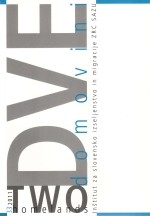Brain Talent Circulation: A New Aim for Countries Connecting with Diasporas
Keywords:
migration, brain drain, scientific diaspora, brain talent circulationAbstract
The author tries to explain the phenomena of brain drain, brain gain and brain circulation. Since many countries are confronted with brain circulation, it has become a new aim of national strategies in connecting countries with diasporas. To explain the reasons for these migrations, the author used foreign studies, existent statistic information and the extensive public debate, which started in Slovenia. On this basis, she tries to answer the question whether Slovenia is facing brain drain or not, and states the most recent measures taken in the country. The author also mentions some examples of good practices and initiatives of international organizations considering brain circulation and then analyses networks, which are used for communicating with scientifi c diasporas. A part of these networks is also online communication with the help of new online communication technologies.
Downloads
References
Akcijski načrt sodelovanja s slovenskimi znanstveniki in drugimi vrhunskimi strokovnjaki v tujini. Ljubljana: Urad Vlade RS za Slovence v zamejstvu in po svetu, 2009, WWW.USZS.GOV.SI (11. 1. 2011).
ASO Lj. – Avstrijski znanstveni inštitut v Ljubljani http://www.aso.zsi.at/ (30. 11. 2010).
Bevc, Milena, Klemen Koman in Nika Murovec (2006). Človeški viri v razvojno raziskovalni dejavnosti v Sloveniji in primerjava z državami EU. Ljubljana: Inštitut za ekonomska raziskovanja, 272.
BRAINDOC, (www.braindock.ch) (5. 1. 11).
Castles, Stephen in Raul Delgado Wise (ur.) (2008). Migration and Development: Perspective from the South. Geneva: International Organization for Migration, 324.
Chaparro, F., H. Jaramillo in V. Quintero (2004). Role of Diaspora in Facilitating Participation in Global Knowledge Networks: Lessons of red Caldas in Colombia. Report prepared for the Knowledge for Development Program of the World Bank. Bogota, 27.
Cizelj, Boris (ur.) (2010). Knowledge Transfer for Development – Circulation of Scientifi c Talent and Communication with Diasporas (Compendium), http://www.eref.eu/previous-fora/eref-2010/workshops-2010/ (15. 11. 2010).
Dežela Furlanija-Julijska krajina, www.pordenonesinelmondo.com (5. 1. 2011).
Dežela Veneto, www.bellunoradici.net (5. 1. 2011).
Dežela Spodnja Avstrija, www.blaugelbinderwelt.com (5. 1. 2011).
Diaspora Knowledge Networks: UNESCO SHS, www.unesco.org/shs/migration/diaspora (18. 12. 2010).
EC Communication on the conditions of entry and residence of third-country nationals, http://eur-lex. europa.eu (5. 1. 11).
EREF Network, http://www.eref.eu/previous-fora/eref-2010/workshops-2010/ (15. 11. 2010).
Faller, Tanja (2010). Lessons Learnt on Diaspora Networks of the Highly Skilled, http://www.eref.eu/previous-fora/eref-2010/workshops-2010/ (15. 12. 2010).
Finn, Michael G. (2007). Stay Rate Foreign Doctorate Recipients from U.S Universities, 2005, http://orise. orau.gov/fi les/sep/stay-rates-foreign-doctorate-recipients-2005.pdf (3. 1. 2011).
Finn, Michael G. (2005). Stay Rate Foreign Doctorate Recipients from U.S Universities, 2003, http://orise. orau.gov/fi les/sep/stay-rates-foreign-doctorate-recipients-2003.pdf (3. 1. 2011).
Finn, Michael G. (2003). Stay Rate Foreign Doctorate Recipients from U.S Universities, 2001, http://orise. orau.gov/fi les/sep/stay-rates-foreign-doctorate-recipients-2001.pdf (3. 1. 2011).
Froitzheim, Konrad (2002). The UNESCO Virtual Laboratory Toolkit, http://virtuallab.tu-freiberg.de (23. 12. 2010).
Green Paper on an EU Approach to Managing Economic Migration. Brussells: European Commission, 2004, http://eurlex.europa.eu/LexUriServ/LexUriServ.do?uri=CELEX:52004DC0811:EN:HTML (10. 1. 2011).
International Mobilty of Highly Skilled, Policy Brief, Paris: OECD Observer, 2002, 8 pp. http://www.oecd. org/dataoecd/9/20/1950028.pdf (3. 1. 2011).
Jin, Misung (2010). Brain Ciculation: Korean Experience, http://www.eref.eu/previous-fora/eref-2010/ workshops-2010/ (15. 12. 2010).
Kaczmarczyk, Pawel (2006). Highly skilled migration from Poland and other CEE countries-myths and reality, Reports&Analyses 17/06, www.csm.org.pl, (8. 1. 2011), 29.
Kuznetsov, Yevgeniy (2008). Why is Diaspora Potential so Elusive? Towards a New Generation of Initiatives to Leverage Countries Talent Abroad, http://www.migration4development.org/docs/kuznetsov_diasporas.doc (30. 12. 2010), 1–16.
Meyer, Jean-Babtiste in Mercy Brown (1999). Scienttifi c Diasporas: A New Approach to the Brain Drain, http://www.unesco.org/most/meyer.htm (5. 1. 2011).
Migration and Development Conference, Conference on migration and development, Final Report, The Government of the Kingdom of Belgium, The Organization for Migration, European Commission, World Bank, Brussels, 15, 15–16 March 2006, 292.
Nacionalni program visokega šolstva 2011–2020: Prvi osnutek s komentarji. Ljubljana: Ministrstvo za visoko šolstvo, znanost in tehnologijo, oktober 2010, www.mvzt.gov.si (15. 11. 2010).
Network of Talent South Tyroleans Living Abroad, www.suedstern,org (5. 1. 2011).
Organizacija Švicarjev v tujini, www.swisscommunity.org (5. 1. 2011).
Ozden, Calgar in Maurice Schiff (ur.) (2005). International Migration, Remittances, and Brain Drain. Washington, D.C.: World Bank.
Policy Coherence for Development, Migration and Developing Countries, OECD, 2007, http://www.oecd. org/document/46/0,3343,en_2649_33935_39207662_1_1_1_1,00.html#downloads (17. 1. 11)
Raziskovalna in inovacijska strategije Slovenije 2011–2020: Osnutek za javno razpravo. Ljubljana: Ministrstvo za visoko šolstvo, znanost in tehnologijo, november 2010, www.mvzt.gov.si (15. 11. 2010).
Skupna novinarska konferenca ministra akad. prof. dr. Boštjana Žekša in ministra Gregorja Golobiča, 5. november 2010, http://www.slovenci.si/sl/znanost.aspx (10. 11. 2010).
Strategija ekonomskih migracij za obdobje od 2010 do 2020. Ljubljana: Vlada RS, 30. 12. 2010.
Turner, W. A. (2003). Diaspora Knowledge Networks, Project proposal for UNESCO‹ ›s International Migration Section on the contribution of information and communication technologies to the development of Diaspora Knowledge Network, First Draft, http://www.limsi.fr/Individu/turner/DKN/ Completed_research/FinalDraft-end.pdf (23. 12. 2010), 24.
Urad Vlade RS za Slovence v zamejstvu in po svetu, http://www.uszs.gov.si/ (11. 1. 2011).
Vary, James (ur.) (2000). Report of the Expert Meeting on Virtual Laboratories. Retrieved from International Institute of Theoretical and Applied Physics (IITAP), http://www.iitap.iastate.edu/reports/vl/ vlfi nal.pd (23. 11. 2010).
Downloads
Published
How to Cite
Issue
Section
License

This work is licensed under a Creative Commons Attribution-NonCommercial-NoDerivatives 4.0 International License.
Authors guarantee that the work is their own original creation and does not infringe any statutory or common-law copyright or any proprietary right of any third party. In case of claims by third parties, authors commit their self to defend the interests of the publisher, and shall cover any potential costs.
More in: Submission chapter





